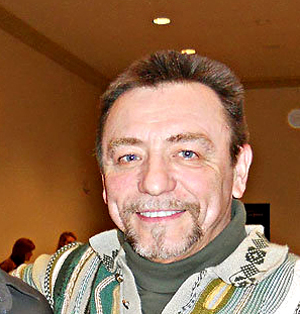 |
| Roger Spurback will retire from block clubs. |
|
|
|
|
|
It's the end of an era really. After 22 years of heading the city's block clubs, building the organization from the ground up, Roger Spurback is retiring.
Spurback has been a tireless advocate for Niagara Falls and even his enemies will admit that. And he has a few. The gruff ex-Marine can be, shall we say, a little abrasive at times. Especially when he sees a wrong that needs to be righted and the politicians don't move fast enough to suit him.
"I am frustrated. But that doesn't mean I don't love this city," he told the Niagara Falls Reporter in an exclusive interview. "I will love this city until the day I die."
Spurback hit on the idea of a citywide block club movement in 1992 after Fran Scarfone, who owned an East Side tavern on Niagara Street, began publicly speaking out about how the neighborhood around her business was rapidly going downhill.
"Fran had a vibrant personality and attitude that said she wasn't going to go away and attitude that said she cared," he recalled. "It wasn't about Fran Scarfone, it was about the community in which she lived, the problems they had and the future of the area."
John Merino, who served as director of Neighborhood Housing Services at the time, called Scarfone after reading an article about her in the Niagara Gazette.
They scheduled a meeting and were astounded by the number of people who showed up to talk about similar problems. One of those was Spurback, who had recently moved from 30th Street to Forest Avenue to get away from the rising crime and encroaching blight.
"The meeting took place in the fall of '93 and we've never looked back," he said. That meeting would become the first of 20 years of meetings and not only entail one neighborhood but led to the growth of the movement of citizens taking back their neighborhoods throughout the city."
For Spurback, the meeting was life changing. He realized that only a grassroots movement made up of honest residents of the crumbling neighborhoods could effect a change.
 |
| Maybe he’s just crazy, but Roger Spurback thinks this house (and 100’s like it) should be torn down before the city gives public money for hotels, concerts or other schemes. |
|
|
|
|
|
"Fran became my colleague and mentor, for together we would circle the wagons and bring about change," he said. "Or so we thought."
But things hardly ever work out like you think they're going to and, in Niagara Falls, it sometimes seems as though they almost never do.
"I am sometimes chastised and humiliated but never back away from a good fight," he said. "As a former Marine, I was taught never back away from a good fight, even if you will ultimately lose because ultimately you will win."
And Spurback fought, ultimately organizing 71 block club organizations throughout the city. He worked closely with city police, identifying problem areas, abandoned houses being used for illicit purposes and organizing parties to remove graffiti as fast as the gangbangers could spray paint it.
But still he felt, through a succession of mayors that included Jake Palillo, Jimmy Galie, Irene Elia, Vince Anello and Paul Dyster, that city government wasn't doing all that could be done to save the declining neighborhoods.
In 2000, he decided to run for city council himself.
"As a Republican, running for city C=council in a city mostly made up of Democrats, I faced an uphill battle from day one," he said. "A little guy with a loud mouth, well, too many people didn't listen to the message of change.
Never before did they hear such an outspoken loudmouth talk about the real problems facing the community," he added with a laugh.
But the rapid deterioration of the city's neighborhoods since the election of Mayor Paul Dyster discouraged even Spurback, who saw decades of hard work being reversed because of simple neglect.
"I'm frustrated with the vision of city leaders," he said. "It is OK to take care of the downtown and tourism and build hotels, but when you let the neighborhoods fall down, nothing else will work no matter how many hotels you build."
Spurback said the problem of abandoned houses is particularly acute in nearly neighborhood of the city. They act as magnets for street crime, prostitution and drug dealing, he said, and soon the decent people living in nearby houses leave the city just to get away from it.
"We put in nice hotels," he said. "What about putting people in nice houses?" |


